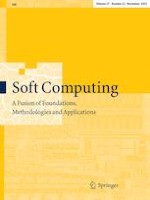19.09.2023 | Focus
Design of Oral English Teaching Assistant System based on deep belief networks
Erschienen in: Soft Computing | Ausgabe 22/2023
EinloggenAktivieren Sie unsere intelligente Suche, um passende Fachinhalte oder Patente zu finden.
Wählen Sie Textabschnitte aus um mit Künstlicher Intelligenz passenden Patente zu finden. powered by
Markieren Sie Textabschnitte, um KI-gestützt weitere passende Inhalte zu finden. powered by
